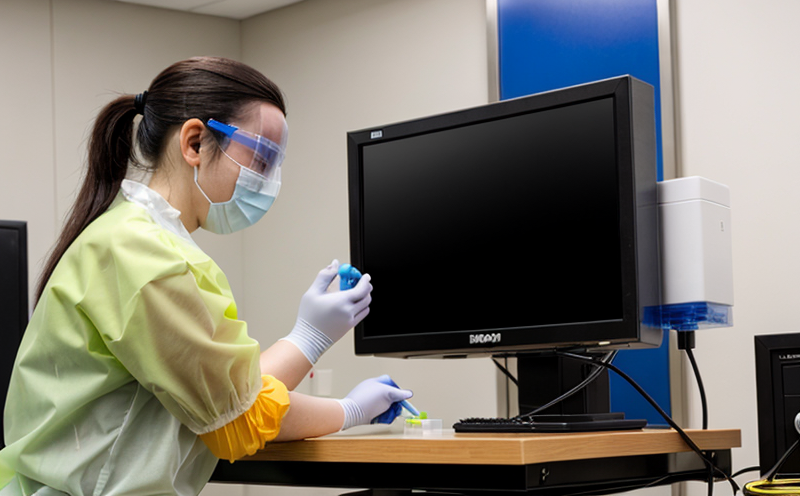Cytocompatibility Testing for 3D Printed Implant Materials
The development of 3D printed implant materials has revolutionized medical device manufacturing by enabling the creation of customized and tailored implants. Cytocompatibility testing is a critical step in ensuring that these innovative materials are safe for use within the human body. This service focuses on assessing how cell cultures interact with the surfaces of 3D printed parts made from various biomaterials.
Cellular response to implant materials is essential because it directly impacts patient health and recovery post-surgery. Understanding this interaction helps manufacturers optimize their designs, ensuring that implanted devices do not cause adverse effects such as inflammation or fibrosis. In this context, cytocompatibility testing evaluates whether the material supports cell adhesion, proliferation, and differentiation without eliciting harmful reactions.
Our laboratory uses advanced techniques to conduct these tests in a controlled environment. The process involves exposing cells grown on 3D printed substrates to different chemical treatments or modifications before assessing their viability and functionality. By examining both short-term and long-term interactions between the material surface and living cells, we can provide comprehensive insights into potential biocompatibility issues.
To achieve accurate results, our team follows strict protocols aligned with international standards like ISO 10993-5:2018. These guidelines ensure consistency across all samples tested and help identify any inconsistencies that might arise during the manufacturing process or post-production modifications. Additionally, we employ state-of-the-art microscopes equipped with confocal laser scanning capabilities to visualize cellular behavior at a microscopic level.
Another key aspect of our service is providing detailed reports summarizing each phase of the test procedure from sample preparation through final analysis. These documents include photographs and graphs illustrating various stages of cell growth on treated surfaces, as well as statistical analyses comparing multiple iterations of the same design. Such transparency allows clients to make informed decisions about future product development while also meeting regulatory requirements set forth by governing bodies such as FDA or CE marking authorities.
For quality managers responsible for overseeing production processes, this service offers valuable data points regarding material selection and processing parameters that could impact overall device performance. Compliance officers can leverage the results of these tests to ensure adherence to relevant regulations throughout product lifecycle stages. R&D engineers benefit from gaining deeper knowledge about how specific modifications affect cellular responses, allowing them to iterate on designs more efficiently.
Lastly, procurement professionals will find this service particularly useful when evaluating suppliers who claim their products meet certain biocompatibility standards. With access to precise measurements and observations made during testing, buyers can verify claims against actual performance metrics provided by third-party laboratories like ours.
Scope and Methodology
| Test Specimens: | 3D printed parts of various biomaterials, including metals, ceramics, polymers. |
| Cell Lines Used: | HEK 293T cells, human fibroblasts, osteoblasts. |
| Testing Environment: | Controlled temperature (37°C), humidity levels maintained at 95%, CO2 concentration set to 5%. |
| Measurement Techniques: | Microscopy, flow cytometry, viability assays. |
Quality and Reliability Assurance
In order to maintain high standards of accuracy and reliability in our testing procedures, we implement several measures throughout the entire process. From initial consultation with clients regarding their specific needs, through sample preparation, experimental design, execution, and finally data interpretation and reporting, every step is carefully monitored by qualified personnel.
Our quality management system is ISO 15195:2016 certified, ensuring adherence to best practices in medical device testing. Regular internal audits are conducted to identify areas for improvement and maintain compliance with current regulatory requirements. External accreditation bodies periodically review our operations to confirm continued satisfaction of applicable standards.
Client feedback plays a crucial role in refining our services continuously. We actively seek input from previous customers to understand their experiences fully, recognizing that each project may have unique challenges requiring tailored solutions. By fostering open communication channels between us and our partners, we aim to deliver not just reliable test results but also actionable insights that contribute positively towards successful product launches.
Competitive Advantage and Market Impact
- Unique combination of expertise in 3D printing technology alongside traditional medical device testing methods.
- Pioneering approach combining cutting-edge analytical tools with classical biological assays to provide a holistic view of material biocompatibility.
- Fast turnaround times without compromising on thoroughness, enabling quicker iteration cycles for R&D teams.
- Comprehensive reporting package including raw data, visualizations, and statistical analysis facilitating easier interpretation by stakeholders involved in decision-making processes.
By leveraging our extensive experience in this field, we position ourselves at the forefront of innovation within the medical device industry. Our services are highly sought after due to their ability to bridge gaps between technical advancements in 3D printing and practical considerations related to patient safety and regulatory compliance. This unique positioning allows us to offer valuable support to companies looking to enter or expand into this rapidly growing market segment.





